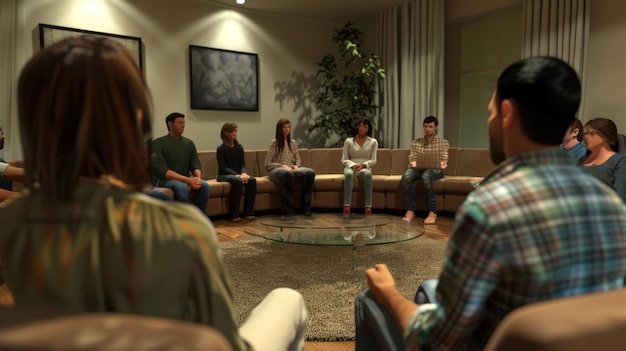How to Talk to Your Doctor About Your Digital Addiction: A Guide for 2025

Talking to your doctor about your digital addiction in 2025 involves recognizing the problem, gathering data on your usage, being honest about your struggles, asking specific questions, and collaborating on a treatment plan that may include therapy, support groups, or medication.
Addressing a digital addiction can feel overwhelming, but taking that first step to discuss it with your doctor is a crucial one. This guide provides actionable advice on how to talk to your doctor about your digital addiction: a guide for 2025, ensuring you can effectively communicate your concerns and find the support you need.
Recognizing and Acknowledging Digital Addiction
Before scheduling that appointment, the initial hurdle is often admitting there’s a problem. Digital addiction, characterized by compulsive online behavior despite negative consequences, isn’t always about the amount of time spent online, but rather the impact it has on your life.
Signs of Digital Addiction
Identifying the symptoms is a pivotal first step. Consider these signs:
- Difficulty controlling your digital device usage, leading to failed attempts to cut back.
- Experiencing withdrawal symptoms like irritability or anxiety when you’re unable to access digital devices.
- Neglecting responsibilities at work, school, or home due to excessive use.
- Continuing to use digital devices despite it causing issues in relationships or other areas.
Acknowledging these signs is the first step toward recovery. Remember, seeking help is a sign of strength.
Preparing for the Conversation
A successful conversation with your doctor often hinges on preparation. This means gathering information and reflecting on your digital habits.
Tracking Your Digital Usage
Before your appointment, monitor your digital usage for a week or two. Note the following:
- Which devices and platforms do you use most frequently?
- What time of day are you most likely to engage in digital activities?
- What triggers your urge to use digital devices?
- How do you feel when you abstain from them?

Documenting this information will provide your doctor with a clear picture of your digital habits and potential triggers.
Opening the Dialogue with Your Doctor
Initiating the conversation can feel daunting, but remember, healthcare professionals are there to support you without judgment.
Consider starting with a simple statement such as, “I’ve been concerned about my digital device usage and how it’s impacting my life.” Be honest about your struggles and don’t downplay the issue. Describe the challenges you’re facing, like difficulty focusing at work or neglecting personal relationships.
Describing the Impact on Your Life
It’s crucial to illustrate exactly how digital addiction is negatively affecting your daily life. This helps your doctor understand the scope of the problem and recommend appropriate interventions.
Physical and Emotional Effects
Detail any physical ailments you’ve experienced as a result of digital overuse:
- Eye strain and headaches
- Neck and back pain
- Sleep disturbances
Moreover, be transparent about the emotional toll it’s taking. Are you experiencing increased anxiety, depression, or feelings of isolation as a result of your digital obsession?
Treatment Options and Setting Realistic Expectations
Discussing treatment options is an integral part of the conversation. Keep in mind that overcoming digital addiction is a journey, not a destination, and setting realistic expectations is important.
Forms of Treatment
Ask your doctor about different treatment approaches:
- Cognitive behavioral therapy (CBT) to address underlying thought patterns and behaviors
- Support groups or online communities where you can connect with others who are facing similar challenges
- Medication, if appropriate, to manage co-occurring mental health conditions like anxiety or depression

Together, you can create a personalized treatment plan that aligns with your goals and preferences. It’s essential to acknowledge that setbacks may occur, and to approach them with resilience and self-compassion.
Building a Support System
During your discussion ensure to talk about support system. This includes family, friends, and any resources available within your community.
Your doctor should be able to help you brainstorm strategies for building a strong support network. This may involve seeking therapy where you can work on developing coping mechanisms and strategies for managing cravings.
| Key Point | Brief Description |
|---|---|
| 📱 Recognize Addiction | Acknowledge problematic digital behaviors. |
| 📝 Prepare Details | Track your digital usage habits. |
| 🗣️ Open Discussion | Start an honest conversation with your doctor. |
| 🤝 Seek Treatment | Explore therapy, support groups, or medication. |
Frequently Asked Questions
▼
Digital addiction, sometimes called internet addiction, happens when a person can’t control how much they use digital devices or the internet, even when it causes issues in their life.
▼
Discussing digital addiction with your doctor is important because they can help you understand the problem and find effective strategies, such as therapy, to address it.
▼
During the appointment, you can expect to discuss your digital usage habits and how they affect your life. Your doctor will likely ask about your physical and mental health.
▼
While there isn’t a specific medication for digital addiction, your doctor might prescribe medication to treat related issues, such as depression or anxiety that contribute to addiction.
▼
It’s common to feel embarrassed, but remember that doctors are there to help without judgment. Being honest is an important step, and they will work with you for solutions.
Conclusion
In 2025, talking to your doctor about digital addiction is more relevant than ever. Digital devices are integral to modern life, so recognising problematic tech use and taking steps to address those problems is a responsible act. By preparing for the conversation, being honest about your struggles, and collaborating on a treatment plan, you can take control of your digital habits and improve your overall well-being.